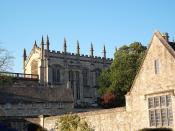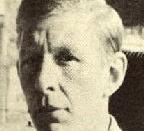Also known as W. H. Auden
Born: February 21, 1907 in York, England
Died: September 28, 1973 in Vienna, Austria
English-born American poet, critic, essayist, dramatist, editor, translator, and librettist
W. H. Auden is one of the finest poets of the twentieth century. His poetry centers on moral issues and verifies strong political, social, and psychological orientations. In his work, Auden applies theoretical and scientific knowledge to traditional verse forms and metrical patterns while incorporating the industrial countryside of his youth.
Auden was born and raised in heavily industrial northern England. His father, George Augustus Auden was a prominent physician whose knowledge extended into the mythology and folklore of his Icelandic heritage, whereas his mother, Constance Rosalie was a strict Anglican nurse. Both contribute strong influences on Auden's poetry. Auden's early interest in science and engineering earned him a scholarship to Oxford University, where his fascination with poetry caused him to change his field of study to English.
Auden familiarity with modernist poetry at Oxford influenced his early writings. It was also at Oxford where Auden became the pivotal member of a group of writers labeled the "Oxford Group" or also known as the "Auden Generation." These authors adhered to various communist and anti-fascist doctrines and express in their writings: social, political, and economic concerns, all of which are evident in Auden's work of the 1930s.
In 1928, Auden's first book, Poems, was privately printed by Stephen Spender, a member of Auden's Oxford Group. Stylistically, these poems are fragmentary and brief, relying on concrete images and informal language to convey Auden's political and psychological concerns. During the same year, T.S. Eliot accepted Auden's verse play Paid on Both Sides for publication in his magazine Criterion. Under Eliot's urging remarks, this play, along with several poems from the 1928 collection, appear...



W. H. Auden
Thank you for a good biography of one of the finest poets of the twentieth century. One of my favorite Auden poems is "Epitaph on a Tyrant." It's only six lines long but conveys with great power Auden's ability to move us with the simplicity of his verse. I liked your chronology of key events in Auden's life at the end of your essay.
10 out of 10 people found this comment useful.